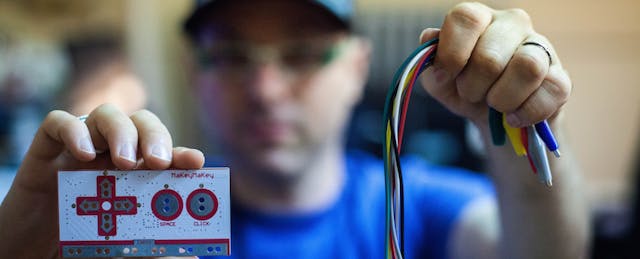Editor’s Note: ‘Tis the trendy season for trends, to reflect on 2015 and to make bold predictions about what next year may hold. This year, we asked thought leaders to share their outlooks on education, but with a twist. They have to frame their thoughts as a response to some of the finest college application essay prompts—yes, the very same ones that high school seniors are feverishly working on now!
Here’s what Jay Silver, Founder and CEO of Makey Makey, had to say.
Q: University of Chicago alumna and renowned author/critic Susan Sontag said, "The only interesting answers are those that destroy the questions." We all have heard serious questions, absurd questions, and seriously absurd questions, some of which cannot be answered without obliterating the very question. Destroy a question with your answer. (University of Chicago)
Q: How can we tie the Maker Movement to Common Core objectives?
A: The Maker Movement is about making meaning
The maker movement isn’t about robots or 3D Printing or STEM or even building things. It’s a new Renaissance, post-industrial, that is led by each person and every person being fluent with the idea of meaning making, ethics, politics of technology, and conscientization—a Freirian term for the act of learning to see both the invisible box you are oppressed inside of and the doors you can carve to exit the box.
It's an awakening as in Thoreau's concept of living life “awake" vs. “sleepwalking." Hands on project-based learning is a primary example of the reawakening process in action. It is like a school that doesn’t have textbooks going back to primary sources, only reading actual authors. But there is a source even more immediate: conversation with material itself. Through projects, we are probing human psychology and social reality directly with action and experimentation. The creation of physical artifacts is making, but it is only the most concrete expression of that which is more important: making of meaning.
The maker movement is not about the stuff we can make. It’s about the meaning we can make. Makers are making meaning, which has a reified representation in each person’s network of neurons which I might call “worldview." By acting on the world, we act on our view of the world. We reform ourselves by reforming our environment. This is humanity.
This rebirth allows not just the sharing of scientific information but also the instantaneous iteration upon any experiment by anyone connected with the Internet. The low cost to entry allows not just for consensus but also for something I’ll call “divercensus:” a divergent fabric of complex agreements. With divercensus, differences are not just acknowledged; the strength of multiple representations of truth is celebrated as being even more true. Making is about making our world, all together, a direct superdemocracy of creation without permission.


